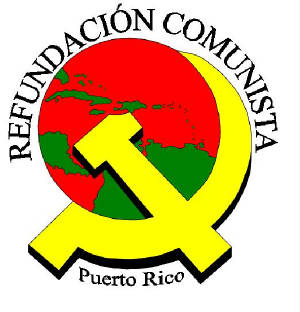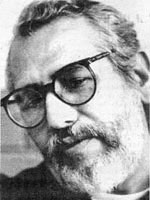
The Ejército Popular Boricua, also known as Los Macheteros, is a clandestine militant and insurgent organization based in Puerto Rico, with cells in the broader US and other nations. It campaigns for, and supports, the independence of Puerto Rico from the United States.
The Cerro Maravilla murders, also known as the Cerro Maravilla massacre, occurred on July 25, 1978, at Cerro Maravilla, a mountain in Ponce, Puerto Rico, wherein two young Puerto Rican pro-independence activists, Carlos Enrique Soto Arriví and Arnaldo Darío Rosado Torres, were murdered in a Puerto Rico Police ambush. The event sparked a series of political controversies where, in the end, the police officers were found guilty of murder and several high-ranking local government officials were accused of planning and/or covering up the incident.
The Fuerzas Armadas de Liberación Nacional was a Puerto Rican clandestine paramilitary organization that, through direct action, advocated independence for Puerto Rico. It carried out more than 130 bomb attacks in the United States between 1974 and 1983, including a 1975 bombing of the Fraunces Tavern in New York City that killed four people.

The Puerto Rican Independence Party is a social-democratic political party in Puerto Rico that campaigns for the independence of Puerto Rico from the United States.
In the United States, a special agent is an official title used to refer to certain investigators or detectives of federal, military, tribal, or state agencies who primarily serve in criminal investigatory positions. Additionally, some special agents operate in criminal intelligence, counterterrorism, or counterintelligence-based roles as well, with one or all of these roles occasionally taking precedence over criminal investigatory tasks.
The Intelligence Directorate, commonly known as G2 and, until 1989, named Dirección General de Inteligencia (DGI), is the main state intelligence agency of the government of Cuba. The DI was founded in late 1961 by Cuba's Ministry of the Interior shortly after the Cuban Revolution. The DI is responsible for all foreign intelligence collection and comprises six divisions divided into two categories, which are the Operational Divisions and the Support Divisions.
Águila Blanca was the name given by Los Macheteros to its robbery of a Wells Fargo depot on September 12, 1983, a day coinciding with the birth date of Puerto Rican Nationalist Dr. Pedro Albizu Campos. The robbery took place in West Hartford, Connecticut, and netted more than $7 million. At the time of the robbery, it was the largest cash heist in U.S. history.

The Socialist Front is a coalition of far-left and pro-independence political organizations in Puerto Rico. The Socialist Front also includes non-partisan activists.
Jorge Aurelio Farinacci García was a Puerto Rican politician and socialist. He held a strong pro-independence stance of Puerto Rico from the U.S. Farinacci died in the morning of August 26, 2006 from complications due to a brain tumor. Farinacci, spokesman of the Socialist Front, suffered from a lymphoma in the brain that had previously affected his kidneys and heart, but was unable to survive this third stage.
"Querido FBI" is a song from Puerto Rican urban group Calle 13. The song was recorded in September, 2005 and released through the Internet about 30 hours after the death of Puerto Rican Revolutionary leader Filiberto Ojeda Ríos in what appeared to be a botched raid at his house.
Filiberto is a given name and a surname. It derives from a Germanic name, latinized in Filibertus and came to Italian through French. It is composed of the roots filu, "much", and beraht or berhta, "illustrious", "brilliant", and means "very bright" or "very illustrious". Its diffusion in Italy is linked to the fact of being a traditional name of the House of Savoy. The French form Philibert originated by alteration with the Greek φιλος (philos), "beloved".
Alternative reggaeton is a subgenre of reggaeton that emerged from the reggaeton movement as a reaction to its repetitive and monotone dembow rhythm, and the predominant stereotypical gangsta content that became predictable. The result was a complex sound derived from world sounds, mainly rooted in other Latin American music based genres such as bomba, plena, salsa, bachata, merengue, cumbia, tango and other foreign influenced music such as alternative rock, rock en español and Latin alternative. Mixed with thoughtful lyricism guided by an anti-colonialism discourse, Latin American sociopolitical content, and racial pride, it gave listeners a smooth blend of danceable rhythms and intellectual dialogue.
The Illegal drug trade in Puerto Rico is a problem from a criminal, social, and medical perspective. Located in the Caribbean, Puerto Rico has become a major transshipment point for drugs into the United States. Violent and property crimes have increased due in part to dealers trying to keep their drug business afloat, using guns and violence to protect themselves, their turfs, and drug habits.
Juan Enrique Segarra-Palmer is a Puerto Rican activist and one of the founders of the pro-independence group Los Macheteros.

Avelino González-Claudio was a Puerto Rican independence activist who served time in a U.S. federal prison for his participation in an armored truck robbery planned by Los Macheteros. Although the robbery took place in 1983, González-Claudio was not apprehended until 25 years later, in 2008. After pleading guilty to conspiracy to commit robbery, González-Claudio was sentenced to seven years in prison in 2010. He was released three years later, in 2013.
José Figueroa Sancha is a former superintendent of the Puerto Rico Police Department and former deputy director of the Federal Bureau of Investigation in Puerto Rico. After being appointed by governor of Puerto Rico Luis Fortuño as superintendent in 2008, he resigned in 2011 amidst criticisms in the middle of a crime wave in the island.
Carlos Muñiz Varela was a Cuban resident of Puerto Rico who was murdered under suspicious circumstances in 1979. Muñiz Varela was an outspoken backer of the Puerto Rican independence movements.
Crime in Puerto Rico describes acts of violent and non-violent crime that take place within the Commonwealth of Puerto Rico.
Rafael "Rafy" Dones Arroyo (1944-1984) was a Puerto Rican alleged drug dealer and independence advocate. Rafy Dones was known for allegedly being one of the first "bichotes"- or drug lords-in Puerto Rico. Dones was friends with Filiberto Ojeda Rios, and he was alleged to have had connections to Los Macheteros, a clandestine militant and insurgent organization that advocates for Puerto Rico's independence from the United States.






